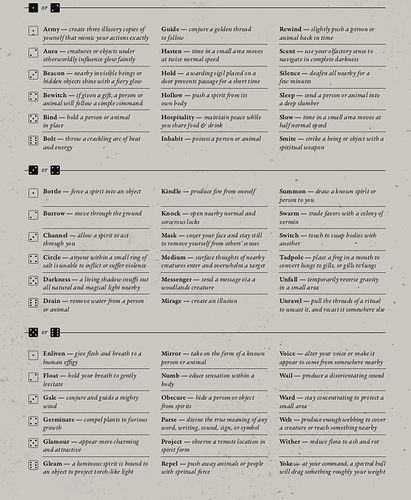A number of (OSR) systems have entire spell lists that fit on one to three pages, including the entire descriptions which are usually one or two lines of text for each spell. I love this, because I find having to look up and read a long spell description and possibly debate what exactly is meant by it during tense (combat) moments really breaks flow, immersion and fun and slows down the game. Short spells descriptions hugely mitigate this.
I would like the list (could be from any game or edition) to include the classics, like Acid Arrow, Lightning bolt, Shield, Fire ball, Feather fall, Lightning bolt etc (if the names are a bit different, that’s ok.)
As far as overpowered and broken spells go, most editions have extremely powerful and suspense/game-breaking spells (or sometimes even Cantrips) at almost every (spell) level. Ideally I would like the more powerful spells, such as Fireball to be set at a much higher spell level. I am making a system where there are still 7 to 10 spell levels. I am also capping player advancement to about 7 to 10th level characters in This way I could make sure that spell levels are actually the same as character level. The implication is that many spells would shift up a few levels. Fireball might be a 5th spell level rather 3rd. Perhaps to compensate, the lower levels could have more specific, single purpose spells.
I will also be using the system that magic is not predictable, casters roll a D20 to see if their spell succeeds (against a target number from 1 to 20 based on the AC or magical nature of opponent and other factors that GM reasons will affect difficulty). Fail the roll and the spell completely fizzles, no harm done. Succeed and and then they roll another D20 to determine how! effective their spell was. Roll 0, that is very bad. So, essentially a spell attack.
Of course bonuses or advantage will be given by the GM to the second roll as well, this way a 6th level caster casting a 1st level spell has a far smaller chance of being rather ineffective compared to a 1st level caster, casting that exact same spell. In some situations perhaps the spells automagically succeeds, no roll needed (high level caster under no stress at all casting innocuous low level spell she has cast 20+ times before or very low power Cantrips).
-> If you succeed on the first roll and then you roll a 5 on your second roll = small ish fireball with not very high damage. Roll 20 and a massive fireball reduces all 7 Orcs to ash. Second roll is essentially a spell damage roll/effectiveness roll.
I won’t be using spell tables or even a truly hard limit on how often a character can cast the same spell or varied spells, but I will limit what spells the character knows (must adventure, apprentice and research for new spells). To limit spell usage without a spell table I have the risks mentioned above and I also implement the following:
As a PC casts more spells in a shorter time period, they will get harder target numbers, even if circumstances are identical otherwise. Cast ‘Light’ first time that day? Target nr is 6, cast it again 5 mins later? Target nr is 9. Again 1 minute after that? Target nr is 16 etc
Forgive the long explanation, but magic is complicated and what I am looking for not that easy/kinda specific.
Should you know of snappy/short spell list that are open source or the creator allows people to drop it into their system, even better. I am sure I would have to rearrange the spells to the spell levels I think would work for my system above and tweak some descriptions, but it would be awesome to have a starting point and get your opinions on spell lists/balancing magic for OSR style, challenging play. Cheers.



